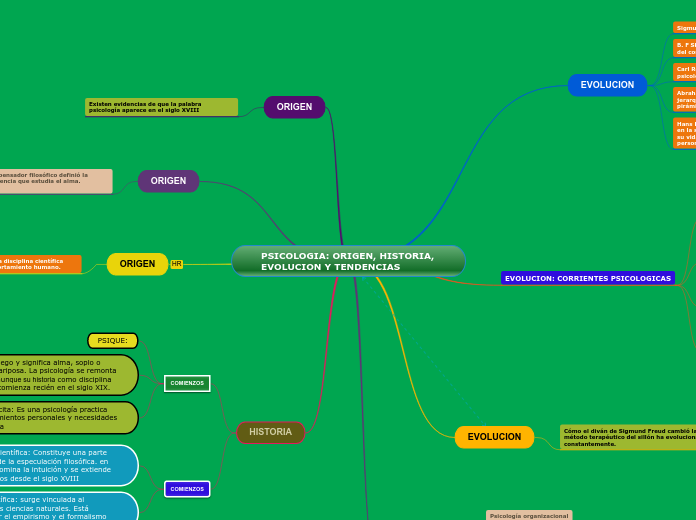PSICOLOGIA: ORIGEN, HISTORIA, EVOLUCION Y TENDENCIAS
Type in the name of the book you have read.
HISTORIA
Type the main events of the book, classifying them in: events from the beginning, events from the middle, and events from the end of the book.
Describe the story visually. Add a representative picture for each of them.
Psicología Científica: surge vinculada al desarrollo de las ciencias naturales. Está influenciada por el empirismo y el formalismo kantiano del siglo 18. Predomina la razón.
Psicología pre científica: Constituye una parte indiferenciada de la especulación filosófica. en esta rama predomina la intuición y se extiende desde los Griegos desde el siglo XVIII
Type the main events from the middle.
Add a representative picture for each of them.
COMIENZOS
Psicología implícita: Es una psicología practica ligada a conocimientos personales y necesidades de supervivencia
Proviene del griego y significa alma, soplo o aliento vital, mariposa. La psicología se remonta a 2.500 años, aunque su historia como disciplina independiente comienza recién en el siglo XIX.
PSIQUE:
Type the main events from the beginning.
Add a representative picture for each of them.
In contrast to the main idea, the theme is the message, lesson or moral of the book.
Some tips to find out the theme of the book easier:
- Try to find it while you are reading. It may be stated or implied.
- Think about how the characters reacted to obstacles.
- Think about the important decisions that the characters made.
- Think about the characters growing or changing throughout the book.
Definición de la psicología: Es la disciplina científica encargada de estudiar el comportamiento humano.
Christian Wolff, este pensador filosófico definió la psicología como: la ciencia que estudia el alma. (dualismo)
Take notes while you read the book. Write here your favorite quotes from the book.
ORIGEN
Take notes while you read the book. Type here the resources, books, or websites that the author mentioned and you want to check out later.
Existen evidencias de que la palabra psicología aparece en el siglo XVIII
TENDENCIAS
Psicología humana
Psicología educativa
Psicología forense
Psicología clínica
Psicologia del niño
Psicología organizacional
The main idea is what the book is mostly about.
Some tips to find out the main idea of a book easier:
- Read the title.
- Look for the text features.
- Figure out if you are reading a fiction or a non fiction book.
- Think about some examples that support this idea.
Cómo el diván de Sigmund Freud cambió la historia, el método terapéutico del sillón ha evolucionado constantemente.
Terapia Sistémica
Terapia de Aceptación y Compromiso
Terapia Dialéctica Conductual
Terapia Cognitiva Basada en Mindfulness
Terapia Cognitivo Conductual
EVOLUCION: CORRIENTES PSICOLOGICAS
Type the names of the book characters. Start with the main character.
Draw arrows to represent the relationship between them and if it is possible write on them what they represent for each other (if they are relatives, friends, lovers, enemies etc.)
Cognitivo conductual
Enfoque Terapéutico
Restructuración cognitiva
Humanismo
sentido de vida
Logoterapia
Conductismo
Estimulo respuesta
Clasico operante
Psicoanalisis
What are the characteristics that best describe the character? Type them here.
El famoso super yo
Aparato psiquico
EVOLUCION
What is the reason why the author wrote the book?
Hans Eyesenk: uno de los psicólogos más importantes en la segunda mitad del siglo XX, dedicó gran parte de su vida a estudiar las distintas características de la personalidad.
Abraham Maslow: Teorizo sobre la motivación y la jerarquía de las necesidades creando la famosa pirámide de MASLOW.
Carl Rogers: Una de las figuras mas importantes en la psicología humana.
B. F Skinner: Aporto a la teoria del conductismo, la idea del conocimiento operante.
Sigmund Freud: Padre del psicoanálisis

